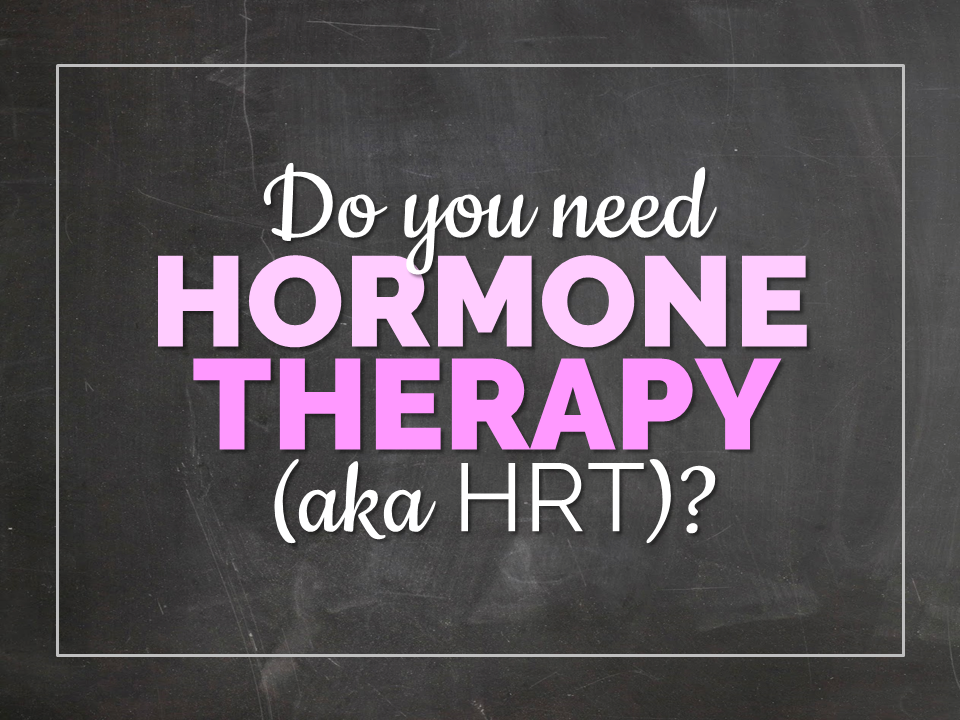I’ve had several questions about this topic.
So, I decided to write this post.
And give you a few references (below).
Before diving in, I just want to preface by saying I’m not a hormone expert.
And I’m not a doctor (and don’t even play one on tv.)
So, everything I’m writing here is based on information I’ve gathered from books, articles, and studies (I’ve included a few references below.)
With that out of the way, here’s the most important thing I know…
Menopause is a natural event in a woman’s life (I know that sounds a little like sex ed 101, but bear with me…)
What I mean is that menopause is normal.
It’s not a condition that needs to be fixed or medicated.
But it can be uncomfortable, especially during perimenopause.
And that’s not solely due to your changing female hormones, but also due to the lifestyle you’re leading.
Lifestyle affects other hormones and the combination of lifestyle and perimenopause is what causes the discomfort.
Hormones never act alone.
I’ll come back to that later.
❤
Transitioning through perimenopause into menopause
So, let’s start with menopause.
Once you’re in menopause (your first full year without a period) your ovaries are producing about a tenth of the estrogen and progesterone they were producing in your fertile years.
However, menopause isn’t a sudden event.
Before menopause is a time called perimenopause, and that can last up to 10 or more years, with seven being the average.
So, in perimenopause, the production of these hormones begins to fluctuate, especially estrogen, making things unstable in your body.
That’s when you may experience things like hot flashes, night sweats, heart palpitations, heavier bleeding, migraines, fat gain around the belly…
And because of the change in the production of these hormones, your body needs to adjust.
Because not only are estrogen and progesterone needed for reproduction, they’re also used by all kinds of other functions in your body.
Estrogen is needed in many processes that affect bone health, heart health, brain health, metabolism and mood regulation.
And progesterone is calming, it helps you sleep better, reduces anxiety, reduces inflammation, and also plays a role in things like heart and brain health, and metabolism.
So, as your ovaries aren’t reliably pumping out these hormones, your body needs to amp up other ways of producing what you need.
That transition takes time, years in fact.
And so those years can be uncomfortable.
And this is where the discussion of Hormone Therapy (HT), formerly called HRT or Hormone Replacement Therapy, comes in…
❤
Hormone Therapy
HT is taking prescribed synthetic, or bio-identical, estrogen and/or progesterone.
And there are many reasons you may opt for HT.
However, if you’re over 45 and in perimenopause, with very little in the way of “symptoms”, then you likely don’t need it.
But if you’re experiencing significant symptoms like very heavy bleeding, or unbearable hot flashes or migraines, then you may want to talk to your doctor about HT.
And if you went into menopause before age 45, either naturally or surgically, you’ll likely be prescribed some form of HT to protect the health of your heart, brain, and bones.
From the literature, there is some risk in taking HT, in particular synthetic hormones.
And although there are bio-identical hormones (BHT) which seem to offer less risk, they aren’t as studied or regulated.
And when I mention risk, it means there’s a higher risk of heart disease, blot clots, stroke, or breast cancer.
But the benefits may outweigh the risks, so it’s important to talk to a doctor who is well educated in this area.
Also, if you’re in perimenopause, the most beneficial type of HT may be progesterone alone, as estrogen is fluctuating, while progesterone tends to stay low.
However, progesterone-only may not be the popular route… It seems estrogen-alone or an estrogen-progesterone combination is usually prescribed.
And beyond menopause, a mix of both hormones seems to offer the least risk.
Taking HT for more than 5 years, or beyond 10 years of menopause doesn’t seem to be recommended unless there are medical reasons (e.g. surgical menopause before 45.)
Now, all this being said, HT isn’t usually necessary.
Most women won’t need it, and even those that do, can benefit greatly from implementing simple lifestyle changes…
❤
Beyond HT
Remember when I said hormones don’t act alone?
Well, cortisol (the stress hormone) and insulin (the energy storage hormone) also play a significant role in perimenopause and menopause.
So, if you’re chronically stressed, meaning your cortisol levels are consistently high because of daily stress (such as anxiety or deep sadness), that can make for a difficult perimenopause experience.
Or, if your blood glucose is consistently high, or you’re overweight, that can also make things harder because you’ve likely got some degree of insulin resistance.
So, given that both cortisol and insulin play roles here, there are things you can do.
1. LOWER YOUR EVERY DAY STRESS
Even if you can’t quit a job or a relationship, you can change how you handle stressful emotions.
You can do this by taking time to rest, relax, and breathe during your day… And prioritizing sleep.
You can be aware that you’re creating your stress by your own thoughts, and you can work on changing those thoughts.
And you can find activities to relieve stress and induce calm like walking outdoors (especially during the day and in green space), doing yoga or tai chi, or meditating a few minutes a day.
Not only will these things reduce your stress and your perimenopausal symptoms, but they can keep you healthier and less prone to disease in the long run.
2, EAT WHOLE FOODS MOST OF THE TIME
You already know, if you read my blog, that processed foods are the worst for blood sugar.
So, choose whole foods as much as you can.
Whole fruits, veggies, legumes, nuts, seeds, eggs, meats, fish,…
If it comes in a bag or box with a long list of ingredients, it’s probably not going to help you.
❤
Trust in yourself
You already have within you the capacity for amazing health and wellness.
It’s innate.
So trust in yourself.
The decision to take supplemental hormones is completely up to you.
Remember that perimenopause and menopause are just phases of your life, like puberty and pregnancy.
These events are natural.
But that doesn’t mean that they won’t be impacted by your lifestyle choices.
So, if you haven’t done it yet, perimenopause is THE time to begin treating your body to the best food, rest, movement, and fresh air.
Lavish your body with goodness.
She deserves it… she’s been supporting you for your whole life.
And if you take care of her, she’ll take care of you.
Keep moving forward,
Debbie
P.S. If you’re in perimenopause or menopause, and you’re struggling to make lifestyle changes, I’d love to help you. Just send me an email at debbie@debbieharbeccoaching.com and tell me what you need help with. You definitely don’t need to go through this alone.
P.P.S. Here are some useful references for you that cover perimenopause, menopause and hormone therapy:
- “Hormone Repair Manual: Every woman’s guide to healthy hormones after 40“, by Lara Briden ND
- “The Wisdom of Menopause: Creating physical and emotional health during the change“, by Christiane Northrup, M.D.
- “Before the Change: Taking charge of your perimenopause“, by Ann Louise Gittleman, PhD, CNS


